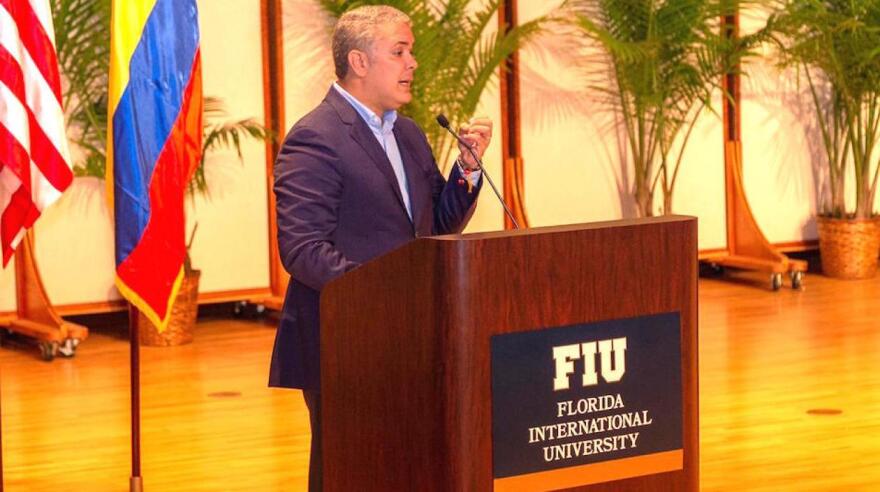Midway through the new Colombian film “Monos,” there is a haunting moment that illuminates, literally, the evil of using children as soldiers.
A squad of teenaged guerrillas is guarding an American hostage in a remote mountain camp that feels like the edge of the earth. One night Colombia’s civil war arrives in a hail of bullets and exploding mortars. One of the kids, nicknamed Rambo, puts on night-vision goggles.
What we now see isn’t children but the skeletal, X-ray ghosts of children. It’s an appropriately nightmarish image that finally vanishes when one of them, a girl named Sueca, escapes to a bunker with the hostage. Amid the violent chaos she blurts out to the woman what she wants to be when she grows up.
“Quiero bailar en televisión.” She wants to dance on TV.
READ MORE: Miami Colombians Divided Over Peace With a Guerrilla 'Mafia'
“Monos” opened in Miami last week. Its Spanish title means “monkeys” – but also cuteness, innocence. It’s about teenagers whose dancing days were robbed.
It’s also an indictment of the monstrous recruitment of thousands of children by left-wing guerrillas and right-wing paramilitaries during Colombia’s civil war. That half-century-long conflict, which killed a quarter million people, ended three years ago. Or so we hope. It turns out “Monos” is premiering at an important moment – and its director, Alejandro Landes, knows that.
“I mean, of course, I couldn’t have timed the release of this film with the recent bit of news,” Landes told WLRN.
That recent bit of news is the decision by several guerrilla leaders to go back to war. They say the Colombian government isn’t upholding its end of the peace agreement; the government says the rebels just want to resume their lucrative criminal activities, like drug trafficking.
Whatever the reason, Landes said he can only hope his film helps convince the dissident rebels and the government to prevent a new conflict – if only to prevent more kids from becoming killers.
Using young teenagers as soldiers just debases all of us. Hopefully the film jars you into asking us as a species some very important questions. –Alejandro Landes
“The fact that it can involve teenagers, adolescents, I think it really just debases all of us,” Landes said. “Hopefully [the film] jars you into asking us as a species very important questions, because it’s very sad to see those lives at that age being hurt.”
One of the actors in “Monos” knows that first-hand. Wilson Salazar became a soldier in Colombia’s Marxist guerrilla army, the FARC, when he was just 11 years old. Landes hired Salazar as a consultant – then cast him in the role of the guerrilla overseer Mensajero, who barks commands during his visits to the teen squadron’s encampment and reminds them the rebel army is now their only real family.
“Wilson said to me, ‘I became so good at destruction, I became so good at war,’” Landes said. “'And to now use everything I learned to create, to make art, to make something, is really incredible.’”
Landes himself is no stranger to the conflict. His family is from northwest Colombia, one of the war’s hotbeds – and he had close relatives kidnapped and killed there by both sides.

“No one was immune to that violence,” he said. “My grandfather’s favorite place in the world was a farm in Córdoba. And that place got so dangerous they had to leave. It ended up in the hands of the paramilitary units – and that was the farm where they supposedly committed some of the biggest human rights abuses the country had ever seen.”
Stories like that also remind us that few Colombian were immune from blame for the half century of war. That’s a big reason “Monos” doesn’t explicitly tell us which side its teen soldiers are fighting for.
It’s also why Landes doesn’t tell us these kids’ backstories. “Monos” is as much “Lord of the Flies” as it is a war story – especially when the teens leave their mountain redoubt and go rogue in the jungle below. Landes wants us to see them as AnyTeens, from anywhere, in any modern conflict.
"I think it’s important to not think of the film as something that happens in some Third World, far-away land,” he said. “As other-worldly as the film feels – I want people to think that maybe it’s not so far away.”
“Monos” is a critical and box-office hit in Colombia. It’s won awards at international festivals like Sundance. And it stands to garner a big audience in South Florida, which is home to the U.S.’s largest Colombian community.
Many if not most expats here were affected by the war – especially those who flocked to Florida International University last weekend to hear a speech by Colombian President Iván Duque. His visit to Miami seemed to make the “Monos” opening all the more significant – if only because he pointed out Colombia may again have to engage armed FARC guerrillas.

“They’re no longer fighting for a social cause,” Duque said of the FARC leaders who want to resume the war. “They’re just a gang of drug traffickers now and they have to be confronted.”
If war does start again in Colombia, the big hope is that at least this time it won’t involve children.
“Monos” is now showing at the Tower Theater in Miami’s Little Havana, 1508 SW 8th St. (In Spanish with English subtitles.)



